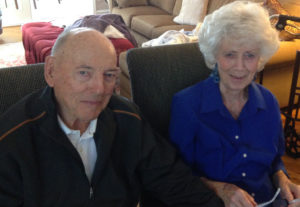How Role Models Can Change the World
Last Friday, my dear grandmother passed away. She modeled a life of grace, strength, and love for everyone who knew her. As a tribute to her leadership, I invite you to read the following post which was originally published just over two years ago…
We all have role models, people who show us the way, not just through their words but through their actions. Some of them might be celebrated thinkers, authors or others in the public eye, people we may never have even met. And some of them might be a little closer to home.

The other day, my 90-year old grandfather broke into the conversation to tell everyone how good my grandmother is at remembering names. “She rarely forgets a name…not just the names of people she meets but of their kids and significant others.”
It was endearing to watch him promote his wife in the presence of others. Then my dad (their son) added, “She remembers names because she is interested in other people.”
I love to be with my grandfather and grandmother. Everyone loves to be with them.
When I was a boy, my grandfather held a standing appointment with me on the golf course. He loves to golf. I didn’t love to golf back then, but I loved to be with him. I don’t remember much about the golf—just that he would listen to me talk. He’d ask me questions, and then he’d take me to lunch after golf and introduce me to his friends. I felt strong, loved and important.
I still do.
My grandparents rarely let the phone go to voicemail when I call. They answer, they tell me that they care about me, they ask me a lot of questions, and they remember to ask about important things in my life.
You’d think I was their only grandchild. But I’m one of eleven, all of whom get this much attention.
You’d think they just focus on their grandchildren. But I’ve seen them make people feel genuinely important in every relationship they have.
In fact, they have poured themselves into human relationships with a profound orientation toward others. With grace and class, their goal with people is to make them feel respected, appreciated and approved. Void of entitlement or expectation from others, they stay present and focused.
My grandfather and grandmother taught Dale Carnegie classes in the 1960s across much of Iowa and Minnesota to help people take this approach in their own relationships. The principles in those classes, from the book How to Win Friends and Influence People, were memorable and simple—easy to understand but requiring accountability and encouragement to apply. Some of which include:
- Don’t criticize, condemn or complain.
- Show honest, sincere appreciation.
- Arouse in the other person an eager want.
- Become genuinely interested in other people.
- Smile.
- Remember that a person’s name is to that person the sweetest and most important sound in any language.
- Be a good listener. Encourage others to talk about themselves.
- Talk in terms of the other person’s interests.
- Make the other person feel important – and do it sincerely.
These days, my grandfather and grandmother ask me to send them our company reports showing how our organization is performing. They review our spreadsheets and send notes back like, “We are proud of you. We love you.” Last week, my grandmother told me she loves to see my name on the reports and that she’s “rooting for” me.
Imagine if all of our workplaces, communities and families could grow toward this approach in relationships.
I’m grateful for the relationship and role models I have with my grandfather and grandmother. Who is it that makes you feel appreciated and important?
Perhaps now is the time to thank them (or remember them) and work toward their example.









Comments are closed here.